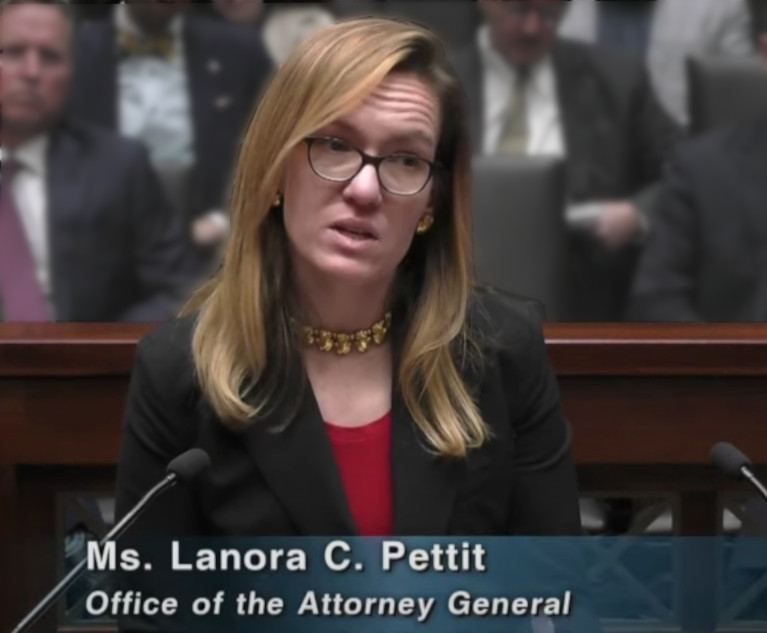San Antonio Judge Disciplined for Facebook Posts That Congratulated Lawyers
The judge's eight Facebook posts, which appeared between August and October 2019, congratulated 12 attorneys on winning jury verdicts, and lauded them for their results and professional backgrounds, the public admonition said.
April 14, 2020 at 01:14 PM
4 minute read
 Bexar County Court-at-Law No. 13 Judge Rosie Speedlin Gonzalez of San Antonio, Texas. Courtesy photo
Bexar County Court-at-Law No. 13 Judge Rosie Speedlin Gonzalez of San Antonio, Texas. Courtesy photo
Using Facebook to congratulate lawyers who won jury verdicts in her courtroom has brought a public sanction for a San Antonio judge.
But Bexar County Court-at-Law No. 13 Judge Rosie Speedlin Gonzalez on Wednesday plans to file notices of appeal for the sanction, said her lawyer, Deanna Whitley.
The Texas Commission on Judicial Conduct gave a public admonition and order of additional education to Speedlin Gonzalez for eight posts she published on her official judicial Facebook page.
But the judge's attorney says the commission should have handled the Facebook posts differently. She said it's not very clear what's permitted in judges' social media posts, and the commission should have instead offered education to Speedlin Gonzalez.
Jacqueline Habersham, executive director of the commission, declined to comment.
Speedlin Gonzalez's eight posts, which appeared between August and October 2019, congratulated 12 attorneys on winning jury verdicts and lauded them for their results and professional backgrounds, the public admonition said. The judge stopped publishing those types of Facebook posts once she received the commission's inquiry in the matter.
But a rule in the Texas Code of Judicial Conduct prohibits judges from lending the prestige of their judicial office to advance their own or others' private interests. The commission determined that Speedlin Gonzalez had willfully and persistently violated that judicial canon when she posted about the lawyers and jury verdicts.
Read the public admonition:
Speedlin Gonzalez said that her Facebook posts published after the verdicts were rendered and the jury was gone. She said she congratulated both prosecutors who won guilty verdicts, and criminal-defense lawyers who won not-guilty verdicts. Yet Speedlin Gonzalez added that the commission raised issues only with her posts that congratulated defense counsel.
Facebook precedent
There is precedent about how the judicial canons apply to judges on social media.
In 2015, then-405th District Judge Michelle Slaughter, who has since been elected to the Texas Court of Criminal Appeals, won an appeal in which a special court of review found she had made errors in judgment, but not willful ethical violations, in her Facebook posts about pending criminal cases.
Read more: Court: Judge Not Guilty of Ethics Violations for Facebook Posts
The Slaughter opinion said, "A judge should never reveal his or her thought processes in making any judgment. Even calling attention to certain facts or evidence found significant enough for the judge to comment on in a pending matter before any decision has been rendered may tend to give the public the impression that they are seeing into the deliberation process of the judge."
The case illustrates that when judges comment on pending cases, there's the risk of a recusal or mistrial. It can detract from the public's trust and confidence in the justice system, the opinion said.
But there's a difference between Slaughter's Facebook posts Speedlin Gonzalez's posts, said John Browning, a partner in Spencer Fane in Plano, who writes, speaks and teaches judges about the ethical use of social media.
Browning, who is not involved in any of the cases, said Slaughter's posts were factual and informative, with a goal of educating the public, and they did not express the judge's opinion.
But Speedlin Gonzalez seems to have voiced her opinion that a lawyer did a great job, Browning added. This could have created the impression the judge was partial to one side, or could have suggested the judge's probable decision in the case, if it ever came before her again, he explained.
"If you are the lawyer on the losing end you have to feel especially bad," Browning said. "Not only did you not get a result you were hoping for, but now you have the judge applauding your opponent."
This content has been archived. It is available through our partners, LexisNexis® and Bloomberg Law.
To view this content, please continue to their sites.
Not a Lexis Subscriber?
Subscribe Now
Not a Bloomberg Law Subscriber?
Subscribe Now
NOT FOR REPRINT
© 2025 ALM Global, LLC, All Rights Reserved. Request academic re-use from www.copyright.com. All other uses, submit a request to [email protected]. For more information visit Asset & Logo Licensing.
You Might Like
View All


Law Firms Mentioned
Trending Stories
Who Got The Work
J. Brugh Lower of Gibbons has entered an appearance for industrial equipment supplier Devco Corporation in a pending trademark infringement lawsuit. The suit, accusing the defendant of selling knock-off Graco products, was filed Dec. 18 in New Jersey District Court by Rivkin Radler on behalf of Graco Inc. and Graco Minnesota. The case, assigned to U.S. District Judge Zahid N. Quraishi, is 3:24-cv-11294, Graco Inc. et al v. Devco Corporation.
Who Got The Work
Rebecca Maller-Stein and Kent A. Yalowitz of Arnold & Porter Kaye Scholer have entered their appearances for Hanaco Venture Capital and its executives, Lior Prosor and David Frankel, in a pending securities lawsuit. The action, filed on Dec. 24 in New York Southern District Court by Zell, Aron & Co. on behalf of Goldeneye Advisors, accuses the defendants of negligently and fraudulently managing the plaintiff's $1 million investment. The case, assigned to U.S. District Judge Vernon S. Broderick, is 1:24-cv-09918, Goldeneye Advisors, LLC v. Hanaco Venture Capital, Ltd. et al.
Who Got The Work
Attorneys from A&O Shearman has stepped in as defense counsel for Toronto-Dominion Bank and other defendants in a pending securities class action. The suit, filed Dec. 11 in New York Southern District Court by Bleichmar Fonti & Auld, accuses the defendants of concealing the bank's 'pervasive' deficiencies in regards to its compliance with the Bank Secrecy Act and the quality of its anti-money laundering controls. The case, assigned to U.S. District Judge Arun Subramanian, is 1:24-cv-09445, Gonzalez v. The Toronto-Dominion Bank et al.
Who Got The Work
Crown Castle International, a Pennsylvania company providing shared communications infrastructure, has turned to Luke D. Wolf of Gordon Rees Scully Mansukhani to fend off a pending breach-of-contract lawsuit. The court action, filed Nov. 25 in Michigan Eastern District Court by Hooper Hathaway PC on behalf of The Town Residences LLC, accuses Crown Castle of failing to transfer approximately $30,000 in utility payments from T-Mobile in breach of a roof-top lease and assignment agreement. The case, assigned to U.S. District Judge Susan K. Declercq, is 2:24-cv-13131, The Town Residences LLC v. T-Mobile US, Inc. et al.
Who Got The Work
Wilfred P. Coronato and Daniel M. Schwartz of McCarter & English have stepped in as defense counsel to Electrolux Home Products Inc. in a pending product liability lawsuit. The court action, filed Nov. 26 in New York Eastern District Court by Poulos Lopiccolo PC and Nagel Rice LLP on behalf of David Stern, alleges that the defendant's refrigerators’ drawers and shelving repeatedly break and fall apart within months after purchase. The case, assigned to U.S. District Judge Joan M. Azrack, is 2:24-cv-08204, Stern v. Electrolux Home Products, Inc.
Featured Firms
Law Offices of Gary Martin Hays & Associates, P.C.
(470) 294-1674
Law Offices of Mark E. Salomone
(857) 444-6468
Smith & Hassler
(713) 739-1250







